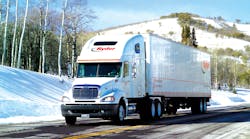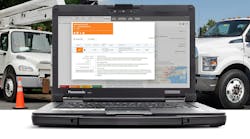Manager: Bill Dawson, vice president of maintenance operations and engineering
Company: Ryder System Inc.
Operation: Manages 231,900 vehicles via 800-plus maintenance facilities and a corps of 5,700 technicians
PROBLEM:
Any fleet operating regularly in winter conditions knows the critical “ins and outs” to keeping trucks safe against the hazards of cold weather—and the maintenance ill effects that can occur from improper practices.
Bill Dawson, for one, knows such hazards well. Over his long career at Ryder System, Dawson has handled regional operations regularly affected by cold, blustery weather. As a result, he understands that simple preventive maintenance practices, such as avoiding “cold soaks,” help prevent any potential damage to Ryder’s diesel truck engines.
A cold soak occurs when engine fluids and the steel of the engine block drops to low ambient temperatures, usually when a vehicle sits for more than a day in frigid temperatures, he explained. Not only does that affect its ability to start, but it affects its electrical charging systems as well.
“When I ran things up in the Northeast, we had a real good handle on such practices,” he explained. “But the problem we saw was how to share such information easily, not just across the entire company but to our customers as well.”
Getting everyone on the same page in terms of important winter maintenance practices would help improve vehicle uptime and lower maintenance costs for all concerned, Dawson stressed.
SOLUTION:
Several years ago, Ryder hit upon the idea of creating an online “winter hub” for key winter maintenance and vehicle operation practices, including written materials such as white papers and videos.
“It may seem simple stuff for customers operating regularly up north, but not everyone does that on a routine basis,” Dawson explained. “We wanted to leverage all the information we’ve gathered over the years into a simple, central resource anyone could use.”
Take fuel and tire pressure, for example. Fleets operating in the southern states don’t typically use “winter weight” fuel, but if they get loads heading north, they should consider using fuel additives to compensate for the cold temperatures they may experience when making deliveries.
“You might be fueling in South Carolina, but if you then send a truck into Chicago in the teeth of a cold snap, you need to think about treating the fuel in the tank,” he said.
Tire pressure can also be affected by cold temperatures; a 20 deg. drop can result in a 4 to 6 psi decrease. That doesn’t just affect tire life, but it could also affect tire traction and handling.
“Having correctly inflated tires in good condition will help prevent breakdowns and accidents,” Dawson explained.
He added that making such detailed winter season tips available to everyone—Ryder personnel, customer fleets, and even the trucking community at large—in one online locale is all aimed at maintaining vehicle uptime while keeping drivers safe in what can be difficult conditions.
“We push our customers and our people to this site because it helps keep everyone safer on the road,” Dawson emphasized.



